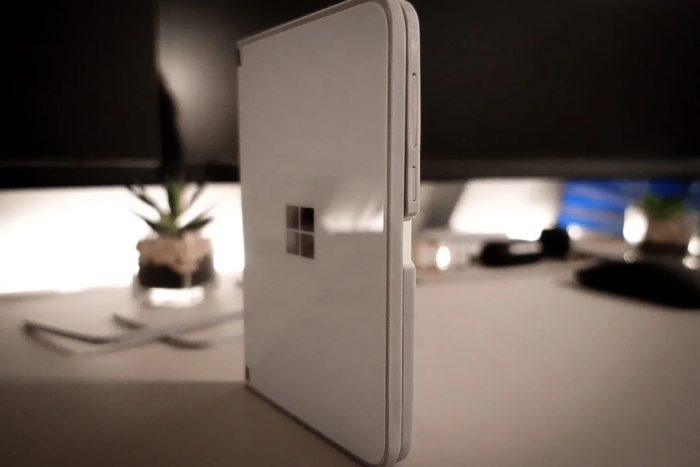Surface Duo isn't dead yet, can still run Windows 11 and Android 14
The performance is surpisingly good
4 min. read
Published on
Read our disclosure page to find out how can you help Windows Report sustain the editorial team Read more

When Microsoft first released Surface Duo, it had high hopes for the unconventional yet user-friendly dual-screen screen phone. The phone never really made it to the top, and the Redmond-based tech giant had to discontinue the series after Surface Duo 2.
Even though Surface Duo wasn’t a successful venture, it managed to attract many to the idea of a dual-screen phone with a hinge in the middle. The conventional foldable phones still feature a single screen that folds along the centre.
A few days ago, Microsoft filed a patent for a foldable phone with a spine cover plate that automatically adjusts when folding/unfolding the device. This got many thrilled about the release of Surface Duo 3.
Whether or not that turns out to be the case, the discontinued Surface Duo series still has a lot to offer.
Developers run Windows 11 and Android 14 on Surface Duo
In a report published by Windows Central, two developers managed to run Windows 11 and Android 14 on a Surface Duo phone.
As for Windows 11, it was Gustave Monce who made a few tweaks to develop a Duo-compatible OS and posted it on GitHub for others to try. Monce works extensively with Surface Duo and Lumia phones.
In the exclusive interview, Monce shared how running Windows 11 on Surface Duo proved challenging, contrary to the popular opinion that it should be easy, given that the device was initially meant as a Windows phone.
Pretty much all the technical challenges were a fun learning experience for me. During the first day we quickly realised that OK, the screens are not going to work … I tried to fight against it, trying to figure out why, and when you lack all the documentation for the device, it’s complicated to figure out … It uses a Snapdragon 855, and that chip is not supported at all by Windows. So, I had to deal with many problems … we started two years ago, and we are not fully done yet. There’s still a few things to figure out. It’s not easy, but … I think in the end it’s a fun experience and something new too.
The results were exemplary, be it performance or adaptiveness to the display size. Besides, working on different apps on the two screens boosted multitasking capabilities.
Coming to the custom Android 14 for Surface Duo that aims to keep the phone up-to-date with the latest version and relevant, given the device has been out of support for a while. The credit goes to Thai Nguyen, an ex-Microsoft developer, who shared the Android 14 ROM on GitHub for others to try.
Nguyen, in the interview, highlights how difficult it is to adapt Android to Surface Duo’s dual-screen setup and the additional work that went into it, which delayed updates to the device.
I think that’s also one of the reasons Microsoft decided to make it a big virtual screen that spans the two physical displays. The approach that Microsoft took here is great because it allows for smooth animations and certain UX/UI. But the problem with this approach is that it’s a lot of effort to do window management.
A few weeks ago, the idea of a foldable Windows phone spread like wildfire and got the community excited!
But isn’t Windows 11 on Surface Duo even better? Although the processor on Surface Duo, Snapdragon 855, doesn’t meet the minimum system requirements for Windows 11, a few tweaks, and you should be able to run the OS just fine. Everyone has had positive feedback about integrating the two, including Gustave Monce.
The same goes for custom Android 14. People like Thai Nguyen won’t let the device become obsolete in terms of app support. Also, he plans on releasing a custom Android 15 for Surface Duo this year.
Do you believe Surface Duo didn’t get its share of success? Share with our readers in the comments section.








